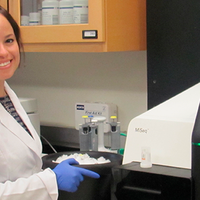"Thorium, uranium, plutonium, these elements, all part of the family of metals known as actinides, share a common property which makes them extremely dangerous: radioactivity. The spread of nuclear energy programs worldwide, once restricted to only a few countries, implies that a growing number of people may accidentally come into contact with, or even ingest, a variety of radioactive elements. Extracting them when they are already inside the human body is tricky and delicate, and as Rebecca Abergel says, “there is an urgent need for a simple and effective oral treatment, whether that be for the personnel of nuclear plants or the potential victims of radiologic weapons.” Abergel is a young French chemist who studied at the Pierre and Marie Curie University in Paris, and is currently directing the Programme of Actinide Decorporation and Biological Chemistry at the National Laboratory, University of Berkeley (US).
Some drugs do exist, such as the DPTA or pentetic acid, but they are not sufficiently versatile considering the urgency of the treatment once the human body is contaminated: on one hand, DPTA needs to be administered intravenously or by nebulization, which is less practical than an oral treatment, and more importantly, it is specific to plutonium and ineffective with uranium. If an accident occurs, it is more likely that the patient has been exposed to a combination of both elements.
Abergel has already achieved assuring results with a new family of molecules that operate through a process known as chelation: the drug “captures” the heavy, toxic metals in the body, preventing them from binding to other agents and is then normally excreted through urine. Based on pre-clinical tests, Abergel says, “this treatment is capable of extracting 90% of metals within the first 24 hours if administered within a few hours of the ingestion,’’ and it is active on a broader group of substances than DPTA. Such molecules have been ''enhanced'' by Abergel's team with respect to similar agents present in nature to have this behaviour specifically on actinides such as uranium and plutonium, and therefore have all the ideal characteristics of the treatment for radioactive metal poisoning.
The chelating process is very delicate as the human body normally contains other metals (notably, iron and zinc) which could be eliminated as well should the drug not be '”selective” enough. That is why new tests are ongoing to prove the absence of side effects of this kind. Abergel has supervised the preparation of the necessary protocols and procedures for the correct preparation of these compounds on an industrial basis. All of this is waiting for the crucial authorisation from the FDA (Food & Drugs Agency) to commercialise the product."




